Whose bread I eat,
his song I sing
September 19, 2007
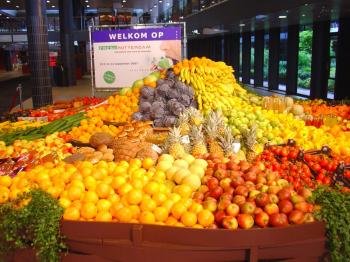
Euroforum’s Foodservice Congress 2007 was held in conjunction with the FRESH food trade fair in Rotterdam. A lavish display of fruits.
With increasing frequency I’ve been attending expert meetings, symposia and congresses relating to the food industry. More and more these points of contact with this complex subculture remind me of the 12th century German proverb, Whose bread I eat, his song I sing. This proverb was likely invoked in a religious tone as an expression of thanksgiving. However, I have always understood it more as a call for autonomous thinking and the potential to bite the hand that feeds me than Whose brand I eat… Here follows a report of my visit to the Foodservice Congress 2007 in the Rotterdam AHOY and the speakers that had the largest impact on me, not a point by point account of the day’s events.
Food is intimate stuff, you put it in your body. Folks responsible for getting it grown, distributed and prepared, carry a huge responsibility to the folks eating or consuming. Last Tuesday at the Rotterdam AHOY, food industry big-wigs gathered in a crystal conference suite to listen to the experts of out-of-house eating talk about trends and future scenarios for their branch. Out-of-house eating refers to restaurants, cantines, (office, school, hospital), snack bars, all-manner of takeaway including everything from gas station sandwich bars to supermarket catering. The theme was responsibility. Considering the industry’s high impact on the environment and even higher impact on public health, I was curious about their take on the theme. Responsibility of the client to the guest/consumer? The responsibility of the manufacturer to the environment/community? Because my standpoint with regard to food is that one should eat (and sell) whole foods pretty much all of the time, and that health and sustainability cannot be benefitted by new food products, I had prepared for a day of self righteous scoffing and taking continual offence at the approach of an industry that earns on competitively produced, placed and priced food products, instead of pure and simple food.
Frank Quix, director of Q&A Research and Consultancy and prof at the U of Amsterdam, started by sharing research on changing Dutch eating habits. The numbers, from research gathered only a month ago, surprisingly show Dutch body weight (as expressed in BMI= body mass index) steadily on the climb. I mean, this is the NL, not North America, so we’re supposed to be riding our bikes to work and eating austere lunches, yet we’re plumpin’ up. The percentage of people in the healthy BMI range (18 - 24,9) is decreasing steadily and both the chubby BMI (25+) and the danger danger BMI (30+) are up by 1 and 2 percentage points since last year. The average number of weekly eating moments rose in just 5 years from 3 to 4 per day.
Remember, this is the crowd that when they hear, ‘2007 shows growth in the perception that breakfast is the most important meal’ hop to and start producing breakfast products. A few percentage points and a gap can unleash a chain events in which somehow increased interest in breakfast ends up equalling increased numbers of breakfast products, with increased numbers of ingredients.
So what about the rising BMI and the theme of the day? I can’t help but wonder if the sort of folks that are tucking into a breakfast product with 26 ingredients are more likely to have a BMI at around 26 than someone that eats a piece of fresh fruit with some full fat yoghurt and a drizzle of honey. That’s me doing some freestyle interpretation, although as of yet unsupported. Quix’s presentation did alert me to the fact that when the food industry talks about health and responsibility, they are talking ‘lite’. It’s difficult to be critical on the receiving end of the food chain.

A wedding cake for heteros made of fish at the FRESH food fair in Rotterdam. Homo version available.
Jan-Willem Grievink is the director of FoodService Instituut Nederland (FSIN) whose goal is to emancipate the Dutch eating-out market. The FSIN has been investigating what they hope will be the biggest foodservice trends until 2015. If this seems like a long way off, consider how long it takes to innovate a new form of food-related business and you can imagine that a 7 year forecast is more about analysing the climate for experimentation, culture of innovation and the availability of investment than about crystal balling the future. It may not be news for North Americans, but the FSIN predicts the Netherlands is on the cusp of embracing combi-forms in the eating-out formulae. Think of evolving the idea beyond chefs preparing fresh takeaway at supermarkets and Ikea restaurants. Grievink is counting on a thorough blend of retail and horeca (A handy Dutch acronym for HOtel, REstaurant and CAfĂ©). This combi-format of out-of-house eating will open up markets and increase competition between sectors that previously weren’t aware of eachother. Suddenly the corner eetcafe will have to compete with the supermarket or (please gawd!) the trainstation.
For folks like me wanting to see local, de-centralised and community-enhancing foodservice trends, Grievink had great news. Even though increased travel to and from work translates into on-the-move eating, Grievink explained how the the Third Place, a non-home, non-work hangout, would become a new place where foodservice has big potential to bloom. It was enlightened of Grievink to cite the Third Place as a trend and I’m hoping the Dutch version will be less like this and more like this. Hey Cultural Sector, wake up, rush through your sun salutations and git some cool grits on the table.
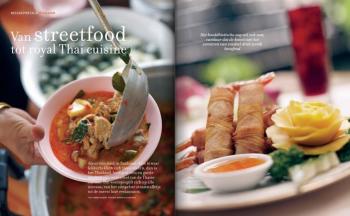
In-house magazine of in-store restaurant La Place costs one EURissimo.
There was no question as to who was the most inspiring and entertaining speaker of the day. Paul Bringmann is the director of La Place, the exemplary in-store restaurant of V&D department stores. Twenty years ago their foodservice underwent a radical change from serving deep-fried krokets, burgers and fried eggs on toast to being one of the best examples of responsible and delicious foodservice in the Netherlands. La Place, in fact a conglomeration of food-service formulae, is a deep green and sustainable business with the numbers to prove that idealistic strategies can be commercially viable.
Bringmann emphasized the experimental nature of V&D’s foodservice transformation which by now includes using and showcasing local regional products, increasingly using organic produce and buying at the source. La Place is also demographic-aware and produce several Asian and Mediterranean cuisines. This is a large food service chain yet they showcase local regional products and buy at the source! La Place recipes (listen up everybody) have an average of 6 ingredients (whole foods!), contain no additives, and the recipes are simple enough to be prepared by adept non-professionals.
Some of La Place’s noteworthy and laudable goals for the future include going ‘maximally’ organic, exclusive use of regional products and… working towards producing nearly all of their own drinks. Just imagine a large company (like M&S foodservice) following La Place’s lead, ceasing to sell Darth Vadermade, producing their own flavoured waters, juices, rootbeers and lemonades with no more than 6 organic and regional ingredients. Applause La Place and Bringmann.
Katja Gruijters (food designer), spoke about food phenomena and trends, giving an excellent image-rich presentation that included a touchy-feely-tasty time, so important to all of us who have enjoyed alternative educations. To emphasize the trends and ahead-of-the-game products, Gruijters brought with her 2 huge shopping bags filled with mostly boutique and artisanal food and drink. Gruijters was the only speaker to elaborate on the positive influence that the new Dutch immigrant population is having as an inspiration to the once homogenous Dutch foodservice. Good eye.
Sadly, Gruijters was the only woman speaker of the day. Now I really like guys, really really. But I just can’t believe there weren’t any other smart women after Gruijters available to speak at this congress. Suggestion for the future, 50% female presence on the podium is a good starting point.
That said, I was very pleased with the thoughtful presentations and well-supported forecasting at this congress and the nourishing examples of what I consider ethical and sustainable foodservice. I didn’t expect that exemplary industry leaders like Bringmann would be so successful and see a future in which they continue to push the envelope. Truly inspiring.
I do have some criticism for a small few of the speakers, you know who you are. Healthy eating is part of a general healthy lifestyle which includes physicality and conviviality, more beet leaves than birthday cake, lots of shmoozin with your farmers and lots of happy memories in the garden, in the kitchen and especially around the table with friends and friendly family.
A healthy food product is more than an expression of calories and the absence of sugars and fats. Even if they have been french-kissed by psychedelic fur balls, happy food moments don’t come in frosty bottles and food products shouldn’t be confused with conviviality. Bottom line, a healthy lifestyle cannot be commodified and only through personal engagement can one enjoy a healthy relationship with food and the food system.
If foodservice companies are truly interested in responsible (business) practice, speakers Grievink, Bringmann and Gruijters offer the most hopeful messages. Their observations and analysis suggest that the future means foodservice that pays more than just lipservice to demographics, locally grown and produced foods, whole foods, culinary craftsmanship and the potential of the socially engaged Third Place. Amen.
- Axel Aubrun’s magnificent and readable treatise on why it’s difficult to think critically about food and complex food systems
A thorough definition of the notion Third Place
Euroforum, host and programmer of the Foodservice Congress 2007 in Rotterdam
El Hema, Mediamatic Amsterdam’s Third Place foodservice design
La Place, Vroom & Dreesman’s exemplary in-store restaurants
FoodService Instituut Nederland (FSIN)
Katja Gruijters, food design for industry
The author’s BMI fluctuates between 21 and 22 in the course of each month. Check your own BMI here but continue to go to birthday parties.
debra at 14:19 | | post to del.icio.us

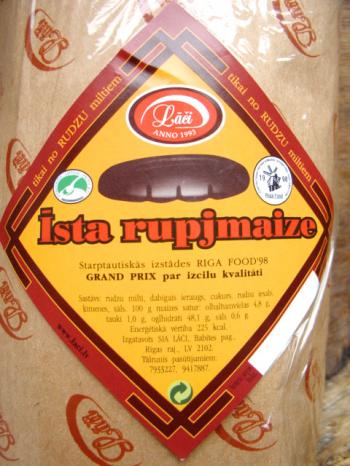


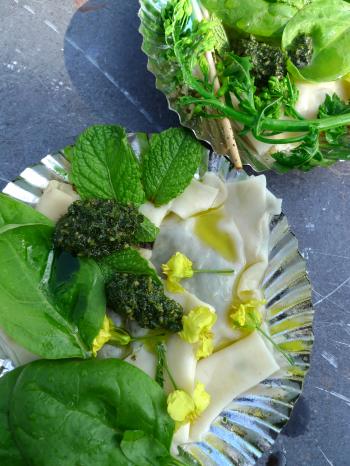









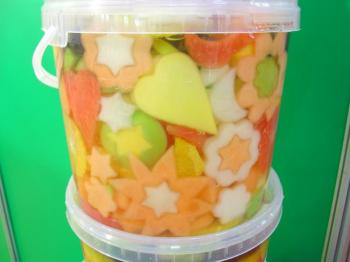
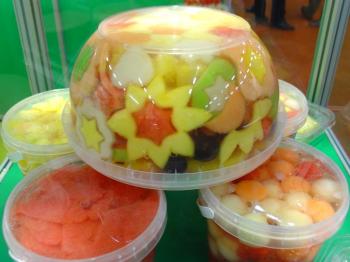



two weeks no new entry! You okay?
Comment by Kristi — September 30, 2007 @ 11:42